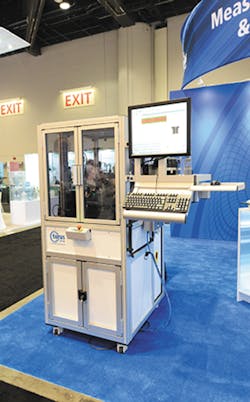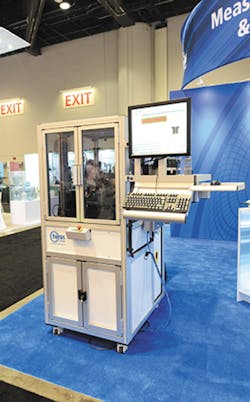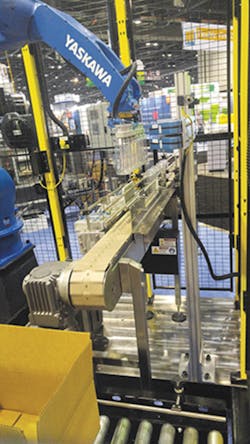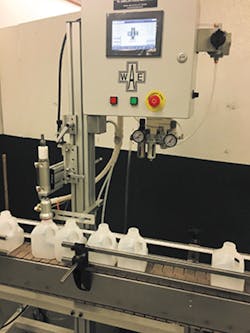Blow Molding lines can handle tens of thousands of bottles an hour. But what about processes downstream?
Built for precision and speed, some of the latest bottle-testing systems have been designed with automation in mind, as well as other benefits, such as space savings and flexibility. Companies at NPE2018 offering such equipment included at least one rookie attendee and a number of veterans, with equipment that can test and palletize containers and preforms.
TORUS
U.K.-based Torus, an NPE first-timer, offered two new preform- and container-measurement systems at the show. An enclosed machine, the B309 Internal Diameter Gauge can be used in laboratory or shop-floor environments. Technical sales manager Spencer Whale explained that it offers more precision and traceability than in-line quality-control equipment. The B309's two cameras locate the center of the neck of the bottle, he said, and then, a white-light sensor "automatically positions itself into the center of the bottle neck, moves to the programmed height positions and takes multiple measurements around the diameter." The technology eliminates the need for any manual steps in the measurement process.
With the company's GaugeXplorer software, users of the four-axis B309 can easily select points and bottle characteristics, including taper angles, to measure. Compatible with a wide variety of containers, from narrow vials to wide-mouth jars, the tester can accurately measure internal diameters to within 0.03mm.
The six-axis B302 TBT Gauge uses sophisticated camera technology to non-destructively measure preforms, bottles and jars made of PP and PET. The six-axis system can measure a number of dimensions, including body, base and wall thickness; neck finishes; perpendicularity; base clearance and pushup; body and internal diameters; and container height. According to the company, it has accuracies of within 0.02mm for wall thickness, 0.05mm for body dimensions and 0.03mm for neck finish dimensions.
It can track each container it measures to its source, including the machine and cavity number where it originated.
"The real advantage of both machines is that they are very flexible," Whale said. "They can measure miniature bottles with neck IDs of 8mm right up to jars that have neck IDs of 145mm."
Like the B309 Internal Diameter Gauge, the B302 TBT Gauge employs Torus' GaugeXplorer software, which provides multiple screens to dig deeper into data involving thickness distribution and container dimensions.
To improve efficiency, container-handling robots can be integrated with both systems.
CONTAINER AUTOMATION SYSTEMS
Container Automation Systems (CAS) also is working to integrate automation into bottle inspection equipment. At NPE2018, it demonstrated its Wall
Thickness System (WTS) with a twist: It's integrated the technology with a robotic case packer, using Yaskawa Motoman robots to position bottles in front of sensors, then pack them. The complete work cell now is available through CAS.
"We have just recently begun offering robotic solutions for the empty plastic bottle industry," company President Ryan Grovijohn said.
In the cell at NPE2018, a GP25 robot from Yaskawa Motoman grabbed the bottles and packed them, after first orienting them for the sensors, which inspected the thickness of each wall.
The WTS, which uses LED lights to produce electronic pulses that bounce off the interior and exterior walls of containers, can be set to automatically alert operators of off-spec measurements, or to reject containers that exceed certain limits. Compatible with almost any container type, the system provides charts in real time of all relevant data, including information about cavity numbers, line speeds and rejection rates.
WTS probes can take as many as 9,000 readings a second.
With the robotic-cell integration, users can squeeze more process steps into a workspace. "Line space is always a premium, so if we can incorporate more features into our robotic cells, we think that will provide value to our customers," Grovijohn said.
But the strongest selling point, he believes, might be the promise of greater peace of mind through quality control. In non-robotic bottle-testing cells, the conveyor and sensors must be positioned to accommodate the size and shape of the bottle that's being tested; because the WTS incorporates a robot, users can increase process repeatability, ensuring that measurements are more accurate.
"People want to automate, but ensuring good parts are being packed is going to be critical to convince those that have not been comfortable with automation in the past to take the plunge," he said.
ALPS
A maker of leak-testing technologies, Air Logic Power Systems (ALPS) has teamed up with vision-inspection expert IMD Inc., Nashville, Tenn., to launch the in-line Total Bottle Inspection Solution. The new technology can detect leaks, contamination and cosmetic defects involving characteristics such as color, as well as perform measurements and check ovality. It inspects containers as they pass on the production line; rejects are directed into a chute.
At NPE2018, Andrew Steiner, applications and sales support manager for ALPS, described the new system as a best-of-both-worlds defect detector.
"It's a very good use of space," he said, as bottles moving on a conveyor traveled past detection heads. In combining ALPS' leak-detection expertise with IMD's visual-inspection acumen, the system provides a more compact way "to be able to do both of the applications in a single frame or in a single platform," he said.
The system can be supplied with two, three or four heads; when specified with four heads, Steiner estimated it can check between 200 and 250 smaller bottles per minute. And, he said, with a couple button punches, an operator can easily reprogram the system to inspect different-sized bottles. The system can track and create reports identifying various failures.
"We can accommodate a wide variety of bottles," Steiner said. "This system is designed to be able to integrate into a customer's existing bottle line."
In addition to launching the Total Bottle Inspection Solution, ALPS now offers an optional testing module replacement for its older-model rotary container-inspection machines, known as Model 7385 two-trip-point units. The new module, called Smart Test, or STM+, uses ALPS' proven Leak Test Controller motherboard technology.
Steiner said ALPS last manufactured the 7385 about 10 years ago, and many of the 5,000-some that were made have been running for 20 or 25 years. The upgrade addresses potential maintenance issues users might encounter with the older hardware.
"This is a way to keep their older machines running in the face of some obsolescence issues," Steiner said.
He could not predict how long the machines might be able to run with the upgrade but pointed to the original components' longevity. And, by replacing the older hardware, he said, users can salvage parts for other machines that might not be able to run STM+. As an added bonus, he said the new module could provide some minor performance enhancements, such as speed or accuracy.
W. AMSLER EQUIPMENT
W. Amsler also promoted a new leak tester.
Designed for blow molded bottles sized from 10 milliliters to 20 liters, the system can test as many as 18,000 bottles per hour. Using an option of either one camera or two, it detects holes as small as 0.006 inch, obstructions in the neck, neck ovality issues and variations in wall thickness. It can use either a continuous-motion conveyor or an indexing conveyor. The standard conveyor is 6.5 feet long; longer lengths and customized conveyors are available.
The leak tester has a powder-coated frame, locking casters and dual guide rails. Optional features include the ability to detect color deviations and fallen bottles and a batch-counting function. The color touch-screen interface graphically displays test results and has an icon-based menu, recipe storage and password protection.
Karen Hanna, copy editor
Contact:
Air Logic Power Systems LLC, Oak Creek, Wis., 877-969-2713, www.alpsleak.com
Container Automation Systems,
Cumming, Ga., 678-947-5656,www.containerautomationsystems.com
Torus Americas Inc.,
Golden, Colo., 303-384-0279,www.torus-group.com
W. Amsler Equipment Inc., Richmond Hill, Ontario, 905-707-6704, www.amslerequipment.com
About the Author
Karen Hanna
Senior Staff Reporter
Senior Staff Reporter Karen Hanna covers injection molding, molds and tooling, processors, workforce and other topics, and writes features including In Other Words and Problem Solved for Plastics Machinery & Manufacturing, Plastics Recycling and The Journal of Blow Molding. She has more than 15 years of experience in daily and magazine journalism.



